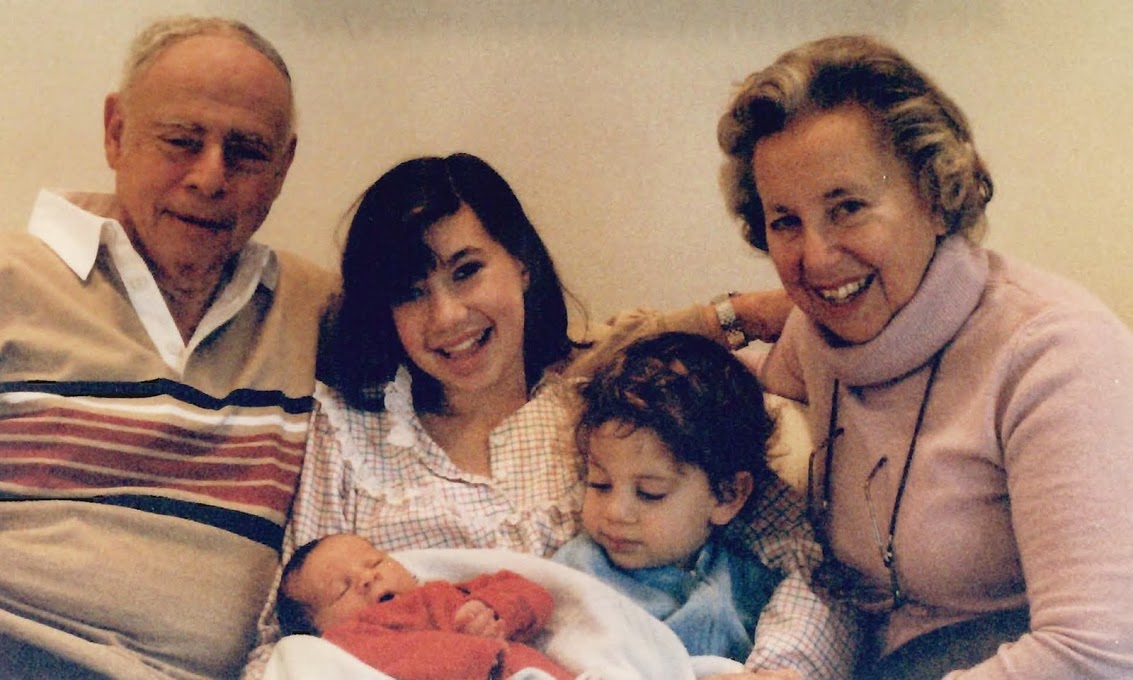
There are two things I will always remember about my grandmother’s death. One is the way her arms and legs chilled immediately but her forehead remained warm for hours. Her brain, I realized, was an engine that had been running for 94 years and only slowly was winding down. The other was this thought: Could she have known she was going to die that day?
My grandmother was 94, an avid bridge player, energetic hospital volunteer, enthusiastic hair salon patron, savvy email user. The last one she ever sent me read: “When you arrive at the airport go down to the baggage department {basement}…you will see a kiosk with names of transportation suggestions, look for American Taxi, be sure it’s not a city taxi.…Any questions call me, I’ll be anxiously awaiting your arrival.” After not seeing her for over a year, this past January I flew from New Orleans to Chicago to visit.
Somewhere over southern Illinois squares of farmland became glazed in white. By the time my plane began its descent the earth was capped in an icy fog, the temperature was -6 F. Chicago was frozen. Bundled in sweaters, expecting to stay just the weekend, my only luggage was a small bag stuffed with magazines, a pair of slacks and collared shirt to wear to dinner that night and a special New Orleans gift, vegan Mardi Gras king cake. Grandma was a meat and potatoes Midwesterner, baffled by veganism, and several other things about my life as a freelance journalist.
Why I didn’t want a regular job at a newspaper or magazine, why I slept on the floor and not in a bed, why I kept my hair so long—my girlfriend Karen had cut it the night before my flight. And yet grandma was not a relic, she had changed over time. When my mother had told her back in the early ‘70s that she was going to apply to law school (many law schools had only just begun accepting women), my grandmother declared it would ruin her career as a house wife. But once my mom graduated and took a job with Legal Aid in New York City my grandmother became proud of her daughter, the New York City attorney. And even though my own stories were rarely her cup of tea, she read them all and emailed me thoughtful comments. “I really liked your article,” she wrote after reading my piece about Inuit bigfoot sightings. “It was most interesting and makes you think of what might be around them that they don’t know.”
Other Great Reads: Death practices of the Inuit
Upon landing I followed her directions, walked down to the baggage department, found the kiosk, called American Taxi and was soon on my way to the city’s northern suburbs, zooming past cars greyed from winter’s road salts. In the suburbs, homes resembled gingerbread houses, snug under a thick blanket of snow. “Oh Justin,” cried grandma, as I opened the door to the home she had been living in since 1949. “I am so glad to see you.”
I think back to that last day and look for clues as to whether she could have known death was near. We spoke about my latest stories and I showed her the Etsy site where Karen sold her clothes. We looked through a photo album of a family vacation to Florida compiled by my mom’s youngest brother. “I just don’t know why he took so many pictures of these fish-shaped mailboxes?” wondered grandma, smiling. Then we had lunch. In her tiny linoleum-floored kitchen, with cabinets painted a time-worn baby blue, I opened the refrigerator door, inside was practically barren. A loaf of sourdough bread, a package of American cheese slices, a plastic bag full of lettuce and a container of Trader Joe’s hummus. From a Lazy Susan, grandma retrieved a quarter-full jar of Skippy peanut butter, delicately excavated with a butter knife. “Don’t worry if you finish it,” she said. “I have more in the basement.”
I later learned that my grandmother had spent weeks chatting with her bridge friends about what to feed me. I think to her veganism meant renouncing food in general. But when someone recommended hummus she proudly purchased a container. I toasted bread for us and grandma piled Cape Cod potato chips on our plates. We ate at her kitchen table, where sat a snipped-out Chicago Tribune article she had set aside for me and a tiny television. For the longest time on the wall was a picture I had drawn as a child of a mottled blue monster devouring the Chicago skyline. We both had seconds of potato chips then Grandma eagerly cut into the king cake, warming slices in the microwave. “Delicious!” she exclaimed. It was to be her last lunch.
And that evening was the final dinner. “If Grandma could have designed her last meal,” my brother Jeff later told me, “It would have been exactly what happened.” We dined with my grandmother’s beloved niece and her husband at the Jewish country club she had belonged to for over half a century. It was a sprawling stone building on a golf course. The extravagance and enforced formality made me cringe but for grandma, it was the world. I wore the khakis and collared shirt and she carted me around to her friends, most of whom were ten years younger than her and not in nearly as good of shape, decorated with canes and walkers and worrisome splotches on their faces. Nonetheless, Grandma spoke of them as if they were teenagers. She called them all girls, as in, “Justin, I want you to meet one of the dearest girls I know.” I felt like I was at a very formal high school social.
Grandma ate a lamb chop she couldn’t stop talking about and in the middle of a lively conversation about Japan she had a spell. Her face froze in mid-speech, she stopped talking and it looked as if she might pass out. But the incident only lasted a moment, her niece asked if she needed some help and grandma said no. We finished dinner and even ate dessert, mango sorbet with a wafer. Picking up our coats, her niece slipped me a note with her number. “I’m very worried,” she said. “Please call if anything happens.”
That night, I walked grandma up the long carpeted flight of stairs, past the bedrooms of my mother and her two brothers, which were still much as they had left them, with yearbooks on the bookshelves and photos on the wall, to her own bedroom, where she had lived alone since Papa Bill passed away 16 years ago. “It usually isn’t so difficult,” she told me, huffing. In the morning grandma was not well and I drove her to the doctor. He immediately called an ambulance. Her heart was beating at twice the normal rate.
Standing around her bed in the Emergency Room with my mom’s eldest brother and his wife, who had driven up from the city, a thoughtful cardiologist explained the situation. My grandmother had atrial fibrillation, they had given her medication to stabilize her heart rate, after a few tests she should be able to come home. She couldn’t be in better hands, it was the same hospital where every Tuesday she volunteered. Her boss, a vivacious woman named Leah even dropped by to say hello.
“Caryl!” she exclaimed. “What are you doing here darling?”
“Oh Leah,” my grandmother replied, a little embarrassed. “I had an incident.”
A 65 year-old gentleman who also volunteered at the hospital, and whom my grandmother had worked with for many years had died unexpectedly just two days prior.
“He passed away in his sleep,” explained Leah.
“I heard,” said grandma, “What a wonderful way to go.”
They moved on to discuss other things, but a bell rang in the back of my mind. When you are young you can safely push the thought away, but eventually people around you start dying, and you are forced to confront that someday you will, too. At 94, my grandmother had seen her husband die, her sister Louise die, and many of her closest friends die. This was one reason why she had begun hanging out with a younger crowd (women in their 80s), because she was outliving all her contemporaries. “It’s a tough thing about growing old,” Grandma had told me over lunch. “Your friends keep dying.” And yet watching them go had made her intimately familiar with the process. When my brother Jeff visited with his girlfriend the year before the three of them had taken a walk in the Chicago Botanic Garden.
“Jeffrey,” grandma had said, over the pleasing gurgle of the Waterfall Garden. “Are you going to get married before I die?” Jeff was taken aback, but Grandma knew her time was not infinite, and she wanted to make the wedding.
The general opinion, I have learned in four years of interviewing people for this blog, is that Americans have lost their way with death.
“We don’t get to see just how dead someone who is dead actually is these days, for me seeing that was life-affirming.” – A designer of deathware
“People are afraid to die, and they are afraid that if you mention death it will bring death.” – Director of Hollywood’s Museum of Death
“In the West, you die and we just put you in the ground and move on, there’s no tradition, no culture, no celebration.” – A forensic artist who has worked with police agencies around the world
“In the nineteenth century we had a much closer relationship with the dead body.” – Author of a book on grave robbery
“Today people die in hospitals, we don’t see dead bodies, they go to the morgue and disappear.” – A Victorian death scholar
“I believe when 19th century funeral directors said, ‘let us take the burden from you, let us handle it,’ is when people became fearful of death.” – founder of a funeral photography business
“It’s because we hide behind death that kids are confused. Kids should know that death is forever, it’s not like in cartoons and it’s not like Xbox 360.” – Author of a children’s book called, “Mommy, what is dead?”
“Once you spend time thinking about death you realize certain things you thought were important are not, and other things you thought were not important are.” – a high school death education teacher
“Mortality is the fundamental form of existence, nothing lasts forever.” – A particle physicist
“You just don’t see when death is going to come.” – Vice President of a company that cleans up after accidental deaths
Tests were done and grandma got transferred to her own room. She requested some items from home and my uncle and I went to get them, a People magazine, a book, her hearing aid. In a paper bag, I placed a few slices of king cake. When we returned to the hospital we realized we had forgotten her cell phone and my uncle went back to get it, I stayed with grandma. A nurse arrived and offered her tea and me some water then left, saying to grandma, “Thanks sweetie,” as she went. Another nurse arrived and showed her how to work the TV, grandma was a big Chicago sports fan. And it was at about that time that her eyes rolled back, her mouth dropped open, her neck arched out like a swan and a strange sound came from her throat. It was not awful.
The nurses called for help. Alarms rang. Doctors rushed into the room, I walked out. A nervous chaplain came to see me in the waiting room. “If you need anything,” he said. “I’m here.” My uncle returned, I caught him by the elevator. Then we got the news, her heart had stopped. The doctors tried valiantly to revive it and eventually did but the process had taken about thirty minutes. “She has been out for a long time,” explained the cardiologist. “She’s 94 years old, I’m nearly 100 percent positive there is no activity in her brain.” Her heart was very weak, he said, it would probably stop again during the night.
But my grandmother was not yet dead. There was color in her face, movement in her body and although she was breathing through a tube her heart was softly beating, about 30 beats per minute, half the normal rate. My uncle began the difficult task of calling family members to tell them the news. I stood by her side. I held her hand, it was cool. I read to her from a book of 8th century Chinese poetry I had in my bag, including this one by Tu Fu:
After sudden rain, a clear autumn night.
On golden waves the sparkle of the Jewelled Cord.
The River of Heaven white from eternity,
The Yangtse’s shallows limpid since just now.
Reflections, pearls from a snapped string:
High in the sky one mirror rises.
Afterlight which fades as the clock drips,
Still fainter as the dewdrops settle on the flowers.
Suddenly, she clenched my hand, then flung it away. Did she not like Chinese poetry? Was she trying to tell me something? In resuscitating her the doctors had cracked some ribs, perhaps she was in pain? I ran and got the nurse.
“Caryl,” he spoke loudly into her ear while gripping her left hand, “Caryl.” But she did not respond. Another nurse tapped her Achilles, a spot which apparently always produces a reaction, but she did not move. The nurse took out the breathing tube and checked to see if she was breathing on her own, she wasn’t. The hand movements were involuntary.
Some minutes earlier, I had called my mother in New York to tell her the news. I knew it was going to be difficult, my mother had talked nightly with grandma on the phone for as long as I could remember. Upon hearing what had happened my mom immediately began wailing. It was a tragic soulful wail, and yet it was so reassuring to hear her emotion. Something about the hospital, as friendly as everyone was, stifled the desire to bawl uncontrollably. The corners were too sharp, the floors too glossy, the lighting too unnatural. Grieving is possible, I felt like I was silently being told, but please keep it to a minimum, keep it within the lines.
But then again, it may not have been the vibe of the hospital making me feel that way, it may have been me. I had never witnessed a death before. Did I even know how to grieve? Speaking with my mother dissolved any confusion. Her anguish was reassuring. This is what we do. We cry. We read poetry to people whose brains doctors say are dead. We hold cold hands that have lost the ability to feel. We search for signs of life. We do things that don’t necessarily seem rational, but do seem right. “You must be there for me,” cried my mother. “You must be there for all of us. You must hold her hand, and whisper in her ear, and tell her each and every one of us loves her.”
And I did. When you are there, standing beside a body whose life is fading, something subconscious takes over. And embracing the body is as natural as swallowing food, breathing air, avoiding a flame. Nothing else mattered, the room dimmed, the entire hospital disappeared, this was the power center, that bed in front of me and the person in it. There was no other thing to pay attention to, the moment was occurring. It commanded everything. Life is rare, and here it was, going. My grandmother’s heart rate dropped to 15 beats per minute, and to 10 and to zero. She was gone.
Before we left I kissed her forehead one last time. More than an hour had elapsed since she had passed. Her arms and legs were now quite cold but surprisingly, her forehead was still warm. I thought of the brain as a slowly cooling engine, but I also thought that perhaps something indefinable was taking its time getting out.
Other Great Reads: How to plan the perfect funeral
It wasn’t until my aunt and uncle had gone back to the city, all the sad calls made, dates for the funeral tentatively set, flights booked, journey for the rest of the family begun, that I was back again alone in grandma’s house, where just the other day we had eaten our simple lunch. I was unpacking the items my uncle and I had brought to the hospital, the People magazine, the book, the pieces of king cake when for the first time, I actually noticed the book, The Beginner’s Goodbye, by Anne Tyler. Grandma’s bookmark, which was the receipt from the local library, had been stuck at the beginning of Chapter 2. The first line was:
Here is how she died.
On a frigid January day with temperatures at -10F we buried my grandmother. My uncles, my mother and I all said a few words. That night, friends and family dropped by the house, that strange empty time-capsule of a home I had come to adore was now packed. There was tons of food but I chose to finish off the king cake. Everyone asked me how I was, and I said, “I am fine.” I really was, but I was also thinking about the page she happened to have been on in her book. Could she have known?
Flying back across the country, tracing the squiggles of some half-frozen river, it struck me. She had been alive for 94 years, and as my brother had learned that day in the botanic garden, she was well aware she would not be alive for that many more. My grandmother had done what many people are unable to do, she had come to terms with death. The question suddenly seemed ridiculous. In her own way, she had known.











Larry
Happy Mother’s Day, Mom, Love, Donna, Larry, Annie, Lauren, Jordyn, Houston, Tatum, and Milo
KC Savage
What an eloquent commentary on your Grandmother’s passing. Your skillful communication is a gift to your family and to us. My condolences to you and to your sweet Mother.
Krista de Jonckheere
I am one of your Mom’s sorority sisters. She obviously passed her caring heart to you, and she must be so proud of you. What a precious tribute to your grandmother! I know that she is smiling in heaven as each person reads your tale. It certainly will be with me for a very long time…My love to your Mom and to your whole family.
BJ
Justin–how beautiful! I am so glad you were there for her and for the whole family. Your grandmother was one of my favorite people–as are you.
Jonathan
My father passed away a few years ago. I was blessed enough to be by his side as he left. I noticed the same thing that his hands immediately began to grow cold. I kept my hand on his head to feel his warmth as it brought me comfort. Very well written post.
Bob Acker
My condolences, Justin. Your writing expresses sincere appreciation for your grandmother that is clear to the outside observer. A Catholic priest at the Air Force Academy chapel suggested during Easter mass that if we dare to love, it is inevitable that we will suffer heartbreak. For many of us, consolation exists in the hope we will meet our loved ones again. Did you feel that you detected an endurance of the living spirit when you wrote “something indefinable that was taking its time getting out”? I wish you well with your writing, all the best in you journeys.
Debbie
What a beautiful tribute to a beautiful and very special woman. Well done.
Mac Bowen
Brilliant and self-aware reflection, friend, and you know she would be proud! My own experience as a provider mostly contained by the sharp cornered culture is that one of the greatest things we can do is validate those awkward, unfamiliar feelings and re-assure that grief is normal and must be expressed however personally felt. I must echo that we have become so detached from death now (and birth even), people that you would think would be preparing are often caught unawares. The medical institution has exacerbated this, and though your grandmother’s death sounded graceful, our default to maximally intervene often makes it less so. My heartfelt thoughts go out to the Nobel clan.
kimbo
Well said. Your observations are beautifully honest.